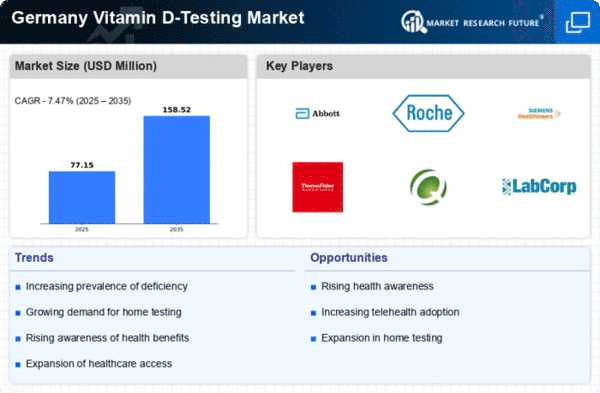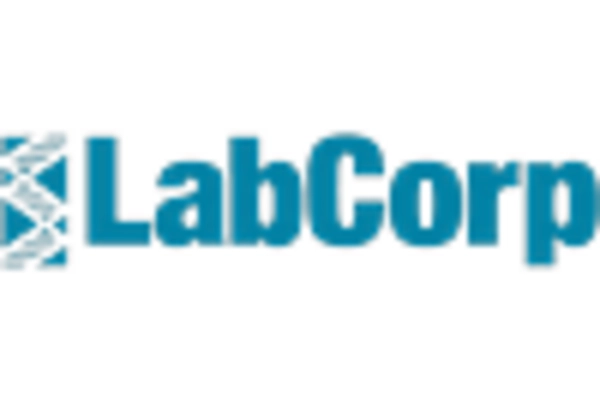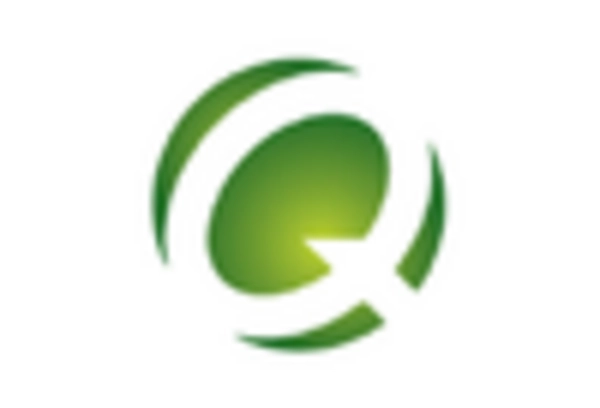Growing Demand for Home Testing Kits
The rising demand for home testing kits is emerging as a significant driver for the vitamin d-testing market. Consumers in Germany are increasingly seeking convenient and accessible options for health monitoring, including vitamin D levels. Home testing kits allow individuals to collect samples and send them to laboratories for analysis, providing results without the need for a clinical visit. This trend is particularly appealing to those who prefer privacy and flexibility in managing their health. The market for home testing kits is projected to grow, as advancements in technology make these kits more reliable and user-friendly. Consequently, the vitamin d-testing market is likely to see an uptick in sales as consumers embrace this innovative approach to health management.
Support from Health Insurance Providers
The support from health insurance providers in Germany is playing a pivotal role in the growth of the vitamin d-testing market. Many insurance plans are beginning to cover the costs associated with vitamin D testing, recognizing its importance in preventive healthcare. This financial backing encourages more individuals to undergo testing, as out-of-pocket expenses are reduced. Additionally, health insurance companies are increasingly promoting awareness about the benefits of monitoring vitamin D levels, which may lead to a higher uptake of testing services. As a result, the vitamin d-testing market is likely to experience growth, driven by the financial incentives and educational efforts from insurance providers.
Rising Incidence of Vitamin D Deficiency
The increasing prevalence of vitamin D deficiency in Germany is a critical driver for the vitamin d-testing market. Studies indicate that approximately 60% of the population may have insufficient levels of vitamin D, particularly during the winter months when sunlight exposure is limited. This deficiency is linked to various health issues, including osteoporosis and immune dysfunction. Consequently, healthcare providers are emphasizing the importance of regular testing to monitor vitamin D levels. The growing awareness among the public regarding the health implications of deficiency is likely to propel demand for testing services. As a result, the vitamin d-testing market is expected to expand, with more individuals seeking to understand their vitamin D status and take proactive measures to improve their health.
Integration of Testing in Preventive Healthcare
The shift towards preventive healthcare in Germany is significantly influencing the vitamin d-testing market. With an increasing focus on early detection and prevention of health issues, healthcare professionals are advocating for routine vitamin D testing as part of comprehensive health assessments. This trend aligns with the broader movement towards personalized medicine, where individual health needs are prioritized. As a result, healthcare providers are incorporating vitamin D testing into regular check-ups, thereby increasing the volume of tests conducted. The vitamin d-testing market is likely to benefit from this integration, as more patients are encouraged to undergo testing as a preventive measure, potentially leading to improved health outcomes and reduced healthcare costs.
Increased Focus on Nutrition and Supplementation
The heightened focus on nutrition and supplementation in Germany is driving the vitamin d-testing market. As more individuals become aware of the role of vitamins in overall health, there is a growing interest in understanding personal nutrient levels, including vitamin D. This trend is reflected in the rising sales of vitamin D supplements, which have seen a notable increase in recent years. Health professionals are recommending testing to determine individual needs for supplementation, further fueling demand for testing services. The vitamin d-testing market is expected to thrive as consumers seek to optimize their health through informed dietary choices and appropriate supplementation based on test results.
















